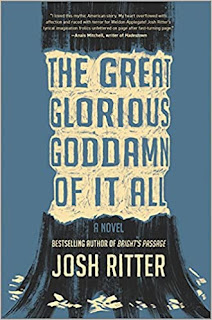One review of this book promised "great Gothic geysers of blood." Which would be a hell of a title, actually. That's not why I chose to read this book, but it certainly lived up to that.
Lots of blood. Lots of killing. Lots of violence.
Too much unnecessary dialogue.
Too many metaphors.
Razorblade Tears is the story of two dads - one white, one Black - whose sons were married to each other and were brutally murdered. The dads weren't good to them in life because of their sexuality. They decide to come together and dig back into their criminal pasts to avenge their sons' deaths.
That's the plot; you could figure that out from the jacket.
After reading the whole book, that's basically it. No hidden messaging. No major plot twist. Just... that.
It was fine. There were some interesting moments, it kept me turning the pages. But, when it got done, it just didn't feel very far from where it started.











